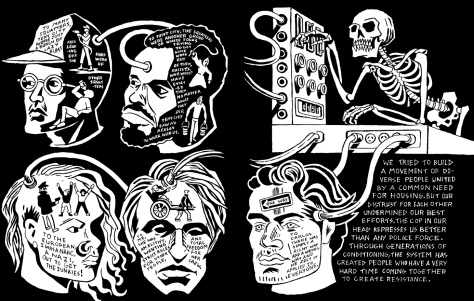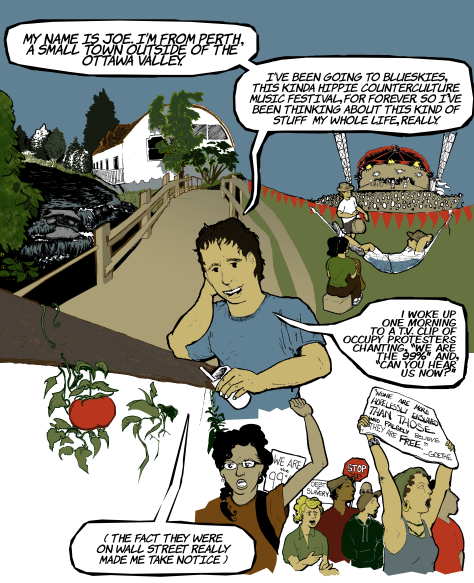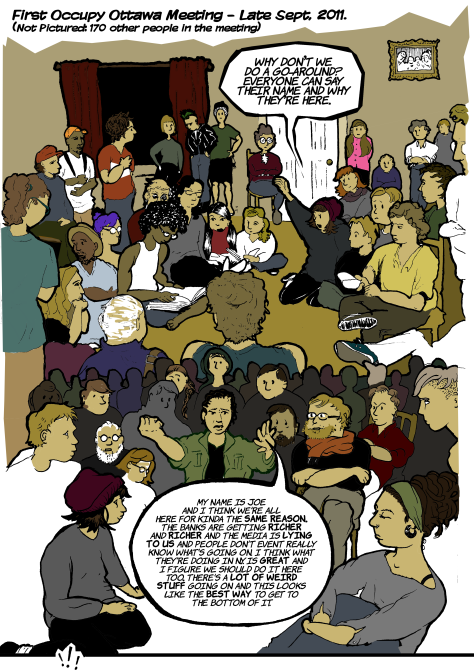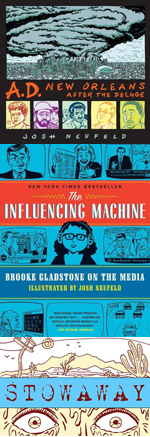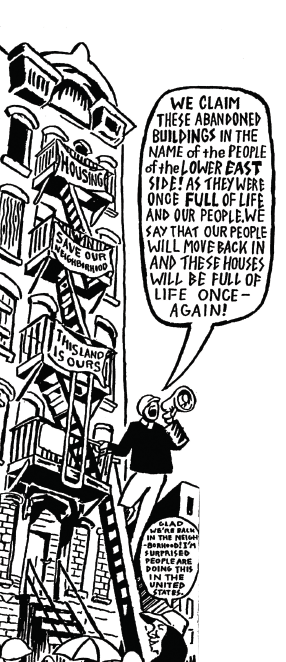 The struggles we find ourselves in –for justice, equality, and a democracy worthy of the name– are not new. Yet we’re endlessly forming new groups, writing new charters, experimenting with new tactics as though we were the first people ever to struggle against injustice.
The struggles we find ourselves in –for justice, equality, and a democracy worthy of the name– are not new. Yet we’re endlessly forming new groups, writing new charters, experimenting with new tactics as though we were the first people ever to struggle against injustice.
Driving across North America in the past year, we were struck by the profound lack of institutional memory in radical communities wherever we went. People doing work that was important, even essential, could often tell us nothing about what their organization had been like 10 years ago, if it had existed at all.
The left leaves few records and most of these are hagiographies–saintly accounts of the lives of larger-than-life heroic figures that read more like myths than histories. It is a rare book that transcends this shallow style and speaks frankly about the painful difficulties encountered by social movements. That kind of book is full of important lessons for us. ”War in the Neighborhood’ is that kind of book.
1: You aren’t the first people to take public space
‘War in the Neighborhood’ is partially about the struggle to protect the public’s right to use Tompkins Square Park. One of those uses, dating to before the struggle, is as the site of a tent city for the homeless. In the course of the struggle to preserve the park as a place to drink and hang out, conflicts with the cops made it an unsafe place to sleep.

Confrontations between cops and activists would raise the emotional temperature of the park, but while the activists could go home, many of the people living in the tent city were home – and had nowhere to go when the cops came to work out their frustrations.

“Reclaiming” urban space is always more complicated than it looks. In North America particularly, that space is always colonized land. In a more immediate sense, the space is often being used by people who don’t want to see it ‘reclaimed’. During the era of the Occupy camps, we dropped into that park without any notion of this. We were bringing media and police attention to a space that homeless people had been living in quietly for years.

I wish we’d all known a little bit more about past struggles like ours, and known ahead of time that we needed to be mindful of the needs of the folks already living in the park. They are capable of doing their own very powerful organizing if they choose, organizing we could have supported if we had treated them with respect.
2: The police are not your friends
Alright, there are plenty of people who know this, and I can hear them into the peanut gallery rolling their eyes at the obvious point and congratulating themselves on how on-point their politics are. Good for you.

The trouble is, not everyone knows this, and vague denunciations of authority from angry punks do not always persuade the larger group. The police are tricky, and they know how to present a friendly face as well as their real one. In ‘War in the Neighborhood’, we see the cops put pressure on squatters by offering them a deal. The squatters, divided by the proposal, eventually accept. Needless to say, they are betrayed by the police.

Some of the people at Occupy knew better than to waste time talking to the cops, but many did not. The police could make little demands about where we put our tents or how we hung our tarps, and sow division without working very hard– these petty demands caused us to turn against each other. They were going to evict us eventually either way but the conflict over whether or not to comply with these petty demands created real conflict between us.
The police are not all billy clubs and tear gas. They will make little helpful gestures to win your trust. At one Occupy march, I remember them sharing bottled water with us. But by then we were wise – “Ew, cop water,” was how one friend put it. Earlier we had not always been so savvy. The police’s polite request to ‘liaise’ (read: pump us for information) or offers to protect our marches (read: control and contain our protests) convinced some people that they were on our side. When they swept into the camp in the middle of the night, tore down our tents and brutalized one of our friends, they made it perfectly clear whose friends they were.
I wish we had all known well enough to be on the same page, and understood the role of the police in suppressing resistance.
3: Outside organizations will try to control your politics
The left is full of self-appointed leaders and self-anointed messiahs. Academics, vanguard parties, one-man black blocs and all kinds of people whose analysis is so pure that they get high on the fumes. These people will show up at your movement and tell you where it’s going, what path it’ll take to get there, and what kind of clothes you should wear for your media appearances. What they won’t do, generally, is the dishes – or anything else useful.
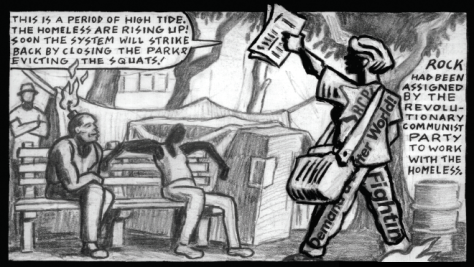
This isn’t so much a problem of ideology as of personality. Some people know how to be humble, pull together as a team and do their share of every kind of work. Some people are so convinced of their special genius that they think they are making the most important possible contributions by telling everyone else what to do and think.

‘War in the Neighborhood’ shows us both kinds of people. Luna, a member of the RCP, becomes one of the most persistent and dedicated squatters. An angry anarchist denounces her participation and the squat as a whole because they are, presumably, guilty by association. Eventually, Luna herself leaves the party over its homophobic views and controlling nature.

When Occupy enjoyed its brief historical moment, plenty of groups wanted to control it. They showed up with their critiques, their literature, sometimes even with printed t-shirts. They would try to change the way Occupy was governed, or how it framed its messaging. Some were a problem, but others weren’t. At the end of the day, it didn’t matter so much what group they were from. What mattered was how willing they were to set their personal politics aside and work for the collective good of the group, instead of trying to co-opt it to serve their own purposes.
It can be a lot to keep track of, especially for folks who are new to activism. But I wish I’d known then what I know now – people show you how much you can trust them based on how respectful and committed their participation is.

4: But you never know who your best comrades will turn out to be…
…but you can find out, easily enough! People vote with their time and energy. Look to see who’s putting in the work and who’s standing around talking shit. In ‘War in the Neighborhood’, we see a variety of people, including communists, ex-cons, teenage anarchists, people with active addictions and the homeless prove to be the best of comrades.
That is not always intuitive. It is easy to be drawn to the most articulate people, or the ones who seem to have the most support in the group. You can be taken in by people’s charms or by the appearance of experience. In the end, though, it doesn’t matter how articulate someone is, how experienced they are, or how great their analysis is, if they can’t put their own agenda aside and work as part of a team.

At Occupy I definitely had a preference for people who shared my politics and cultural values most closely. But I learned in time that I valued the friendships of all kinds of people – liberals, social democrats, other anarchists and even 9/11 truthers (thanfully, those guys came around).
Of course, we were working inside an anarchist framework, with a set of anarchist assumptions. Over time, I watched a lot of those folks evolve into the best anarchists I know. But I think this point holds true no matter what the ideology of your group. If people focus on the work, it doesn’t matter where they’re coming from. You’re headed the same way.

5: Holding space may be the only thing you agree on

Rules are a recurring theme for ‘War in the Neighborhood’. Should this squat be drug free? Should we negotiate with the cops? Are we prepared to tolerate sexism? In different ways these questions are all part of the bigger question: “How will we make this space our own?” and “What is this space for?” But while everyone agrees with ‘making this space our own’, they can’t even agree what that looks like.

At my Occupy camp, and I suspect at many others, the problem was worse, if anything. Should we march? Should we build the camp? Should we make signs? Should we make dinner? Again, holding the park was just about the one thing we all agreed was necessary.
This was a real shock to me. I arrived thinking that people would more or less be there for the same reason I was – tired of the growing power of the rich and ready to hold them to account. The reality was not so simple. I wish I had been able to better anticipate that.
6: People whose help you might hope for will sit on the sidelines and criticize
There were some people who were not so ready to accept the riot of ideas and ideology on display at Occupy. I couldn’t believe them. I was putting aside a lot of my own ideas about how the world should work out of some abstracted sense of the common good. Why couldn’t they do the same?
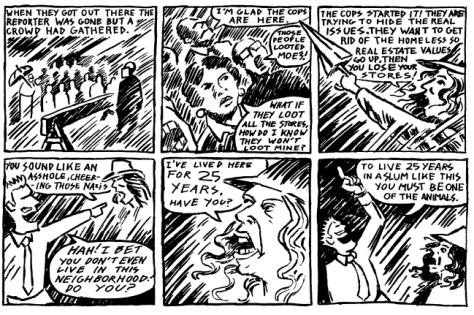
People have agendas. They look at social movements and they ask themselves if these social movements serve those agendas. Then they decide if they are going to participate, criticize, or both. If your revolution doesn’t look like it’s going to serve their purposes, don’t expect to see them frying tofu in the kitchen tent.
“War in the Neighborhood” shows us that people have different reasons for wanting you to fail. Maybe they don’t like some of your members. Perhaps they disagree with your group’s tactics. Maybe they didn’t get their way in your group and so they left.

7: There are no easy answers
Maybe I should have known this one before Occupy started. I thought I knew it, really. I thought I knew that things were so close to hopeless that it would take a change in world conditions to create an opportunity for change. But then in Occupy I saw that opportunity.
In a way, all social struggles have the potential to make us feel like everything has changed. ‘War in the Neighborhood’ shows impossible victories – people taking over abandoned buildings, neighborhood people fighting back against police violence, homeless people winning the right to maintain a tent city in Tompkins Square Park.
But even when all the rules of normal life seem to be inverted, there are no easy answers. You can fight like hell and do everything right only to watch it all fall apart because of some unhappy accident. We are still learning, all of us struggling to build a better world. I don’t think anyone has all the answers. But if we could get better at telling stories about what went right – and what went disastrously wrong – we might not be quite so completely doomed to repeat our history forever.




